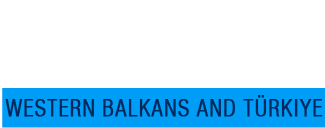BIRN Investigation Wins Second Prize in Regional EU Award for Best Investigative Journalism 2024

A BIRN investigation into armed people-smugglers in northern Serbia along the “Balkan refugee route” won second prize in the Regional EU Award for Investigative Journalism 2024.
Sasa Dragojlo from Balkan Insight received the award for his investigation, “Albanian-Supplied AKs Fuel Violence on Refugee Route Through Serbia”, at the awards ceremony in Ankara on October 25.
The story probes the role of North African gangs in the traffic and the implications for security across Europe.
“I am really happy about the award because it gives new life to the story. In the poor state of journalism, not just in Serbia but globally, the awards are a sign that our work still matters,” he told BIRN.
“The story I did about the war of people-smuggling gangs in the north of Serbia that took so many lives is one of the most complex stories I ever did and crowns three years of investigative work into this type of underworld,” Dragojlo added.

“Over more than six months of collecting evidence, we could describe not only who the gangs were and how they operate – who their leaders were – but also the local Kosovo Albanian mafia that supplied them with weapons as well as the corruption of Serbian police.
“We had so much evidence that we could name the people responsible, practically making a case for the prosecution. The work on this story was so challenging that I think it changed me not just as a journalist but also as a person – for the better, I think,” Dragojlo continued.
The jury classified BIRN’s article as one of the most methodologically complex examples of investigative journalism in the region, taking into account the amount and variety of evidence collected about armed criminal gangs of foreign origin, as well as the Albanian mafia identified as their main arms suppliers.
The jury concluded that a previously unreported story had put a spotlight on an underworld unknown not just to the wider public but also to the expert community.
Conflicts between smuggling gangs in the north of Serbia have claimed a large number of lives, causing unrest among ordinary refugees but also among the local population.
The jury said the investigation has strong regional importance, since it covers the regional issue of migration, the infamous “Balkan route,” and transnational organised crime from several countries, Serbia, Kosovo, and Albania, as well as the phenomenon of migrant smuggling gangs of Morrocan and Afghan origin.
According to them it illustrates a broader picture of one of the biggest current structural problems the European continent faces.

Ksenija Pavkov from N1 from Serbia won first prize for her investigation, “Under the Surface: In the Net,” which exposes the hidden layers of criminal networks, revealing collaborations between crime syndicates and corrupt officials.
Vanja Stokic and Ajdin Kamber from e-Trafika from Bosnia and Herzegovina won third prize for their documentary film “Brother,” which chronicles the struggles faced by migrants, weaving a poignant tale of loss and displacement.
The film covers 18 locations across Bosnia and Herzegovina, Serbia and Croatia revealing more than 50 graves of unidentified refugees and migrants, many of which lack markings. The documentary has received over 30 awards, and an article that was included in the preliminary shortlist for the 2024 European Press Prize.
Ambassador Thomas Hans Ossowski, Head of the EU Delegation to Türkiye, handed the awarded journalists their certificates, congratulating them and highlighting the importance of investigative journalism.
The jury consisted of Dunja Mijatovic, Drago Hedl, and Can Ertuna.
Mijatovic is a former Commissioner for Human Rights (2018-2024) with previous experience as the OSCE’s Representative on Freedom of the Media. Hedl is a seasoned journalist and author who has worked for Radio Free Europe, The Guardian, Time Magazine, and others. Ertuna is an assistant professor at Turkey’s Bahçeşehir University with more than 25 years’ experience, focused on reporting on conflicts and refugee crises for both Turkish and international outlets.

